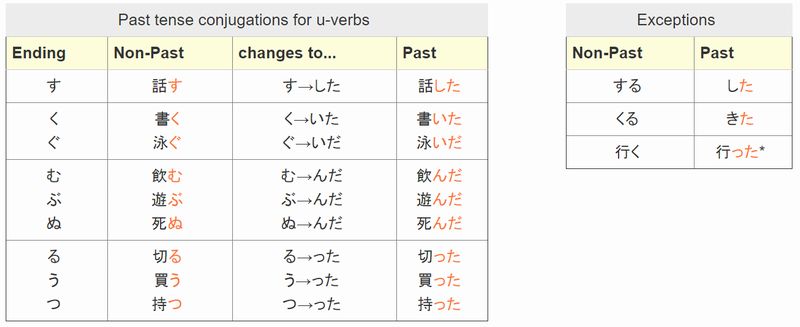Past tense (learnjapanese)
It’s not necessarily that u-verbs end with Hiragana う. It means that the last vowel has to be “u” and hence the last hiragana can be く (ku), す(su), つ(tu *=tsu), ぬ (nu), and even る (ru).
You can break them into 3 groups: んだ (nda) group; った (tta) group, and the rest, and there are rules for each category.
■んだ (nda) group
読む(よむ)to read → 読んだ(よんだ)
■った (tta) group
走る(はしる) to run → 走った(はしった)
■the Rest of the group
The rest of the rules are all dependent on the ending syllables す, く, and ぐ.
— す verb conjugation: Replace す with した.
話す(はなす)to speak → 話した(はなした)
—く verb conjugation: Replace く with いた。
書く(かく) to write → 書いた(かいた)
— ぐ verb conjugation: Replace ぐ with いだ.
泳ぐ(およぐ) to swim → 泳いだ(およいだ)
日本語 / にほんご / Japanese
(1)私は学校で弟と話した。
(2)弟は手紙を書いた。
(3)兄は公園を走った。
(4)兄は学校へ行った。
(5)姉は水を飲んだ。
(6)姉は本を読んだ。
(7)妹は店で服を買った。
(8)妹はかばんを持った。
ことばと表現 / Words & Expressions
話す【はなす hanasu】to talk
手紙【てがみ tegami】letter
書く【かく kaku】to write
兄【あに ani】older brother
走る【はしる hasiru】to run
行く【いく iku】to go
姉【あね ane】older sister
水【みず mizu】water
飲む【のむ nomu】to drink
本【ほん hon】book
読む【よむ yomu】to read
妹【いもうと imouto】younger sister
店【みせ mise】shop
服【ふく huku】clothes
買う【かう kau】to buy
かばん【かばん kaban】bag
持つ【もつ motu】to hold
dictionary forms
(1)話す 【はなす hanasu】 to talk
(2)書く 【かく kaku】 to write
(3)走る【はしる hasiru】 to run
(4)泳ぐ 【およぐ oyogu】 to swim
(5)飲む 【のむ nomu】 to drink
(6)読む 【よむ yomu】 to read
(7)買う 【かう kau】 to buy
(8)持つ 【もつ motu】 to have
英語 / えいご / English
(1)I talked with my younger brother at school.
(2)My younger brother wrote a letter.
(3)My older brother ran in the park.
(4)My older brother went to school.
(5)My older sister drank water.
(6)My older sister read a book.
(7)My younger sister bought clothes at the store.
(8)My younger sister held a bag.
ひらがな / Hiragana
(1)わたしはがっこうでおとうととはなした。
(2)おとうとはてがみをかいた。
(3)あにはこうえんをはしった。
(4)あにはがっこうへいった。
(5)あねはみずをのんだ。
(6)あねはほんをよんだ。
(7)いもうとはみせでふくをかった。
(8)いもうとはかばんをもった。
ローマ字 / Roman letters
(1)Watasi wa gakkou de otouto to hanasita.
(2)Otouto wa tegami wo kaita.
(3)Ani wa kouen wo hasitta.
(4)Ani wa gakkou e itta.
(5)Ane wa mizu wo nonda.
(6)Ane wa hon wo yonda.
(7)Imouto wa mise de huku wo katta.
(8)Imouto wa kaban wo motta.





























No comments yet.